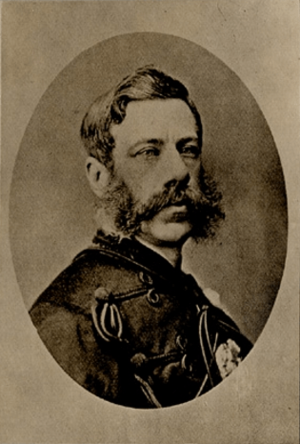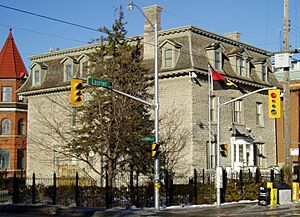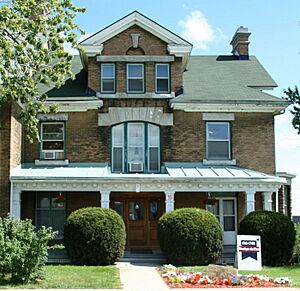Charles-Eugène Panet facts for kids
Quick facts for kids
The Hon.
Charles-Eugène Panet
|
|
|---|---|
 |
|
| Senator for La Salle, Quebec | |
| In office March 27, 1874 – February 4, 1875 |
|
| Appointed by | Alexander Mackenzie |
| Preceded by | Louis Panet |
| Succeeded by | Hector Fabre |
| Personal details | |
| Born | November 27, 1829 Quebec City, Lower Canada |
| Died | November 22, 1898 (aged 68) |
| Political party | Liberal |
| Occupation | lawyer, Senator, soldier, deputy minister of militia and defence |
Charles-Eugène Panet was an important Canadian politician and soldier. He was born on November 27, 1829, and passed away on November 22, 1898. He was a member of the Liberal Party. He served as a Senator for Quebec. He was also a high-ranking officer in the Canadian military.
Contents
Early Life and Education
Charles-Eugène Panet was born in Quebec City on November 27, 1829. His father, Philippe Panet, was a judge. His mother was Luce Casgrain. Charles-Eugène was also related to other important politicians.
He went to school at the Quebec Seminary. He also studied at the Jesuit College in Georgetown, Quebec. Later, he studied law in Quebec. In 1854, he became a lawyer. This meant he could practice law in Lower Canada.
His Family and Homes
Charles-Eugène Panet was married three times. He had sixteen children. A house in Ottawa, Ontario, was built for him in 1876. This house is known as the Panet House. At that time, he was the Deputy Minister of Militia and Defence.
In 1986, the Panet House became part of a special heritage area. Today, this historic house is the Embassy of the Republic of Angola.
Career and Public Service
Charles-Eugène Panet worked as a lawyer for three years. This was from 1854 to 1857. After that, he became a coroner for Quebec City. A coroner is an official who investigates deaths. He held this job for fourteen years.
He was also a soldier. He became a Lieutenant-Colonel in the 9th Voltigeurs de Québec in 1869. This was a military unit. In 1886, he was promoted to Colonel in the Canadian Militia.
In 1874, he was chosen to be a Senator for Canada. Senators are part of the Canadian Parliament. They help make laws. He resigned from the Senate in 1875. He then took on a new role. He became the Deputy Minister of Militia and Defence. This meant he helped manage Canada's military. He held this important position for many years, until 1898.
Memorials in His Honour
A building at the Royal Military College of Canada is named after him. It is also called Panet House. It was built in 1906. This building helps remember his contributions to Canada.
 | James B. Knighten |
 | Azellia White |
 | Willa Brown |



